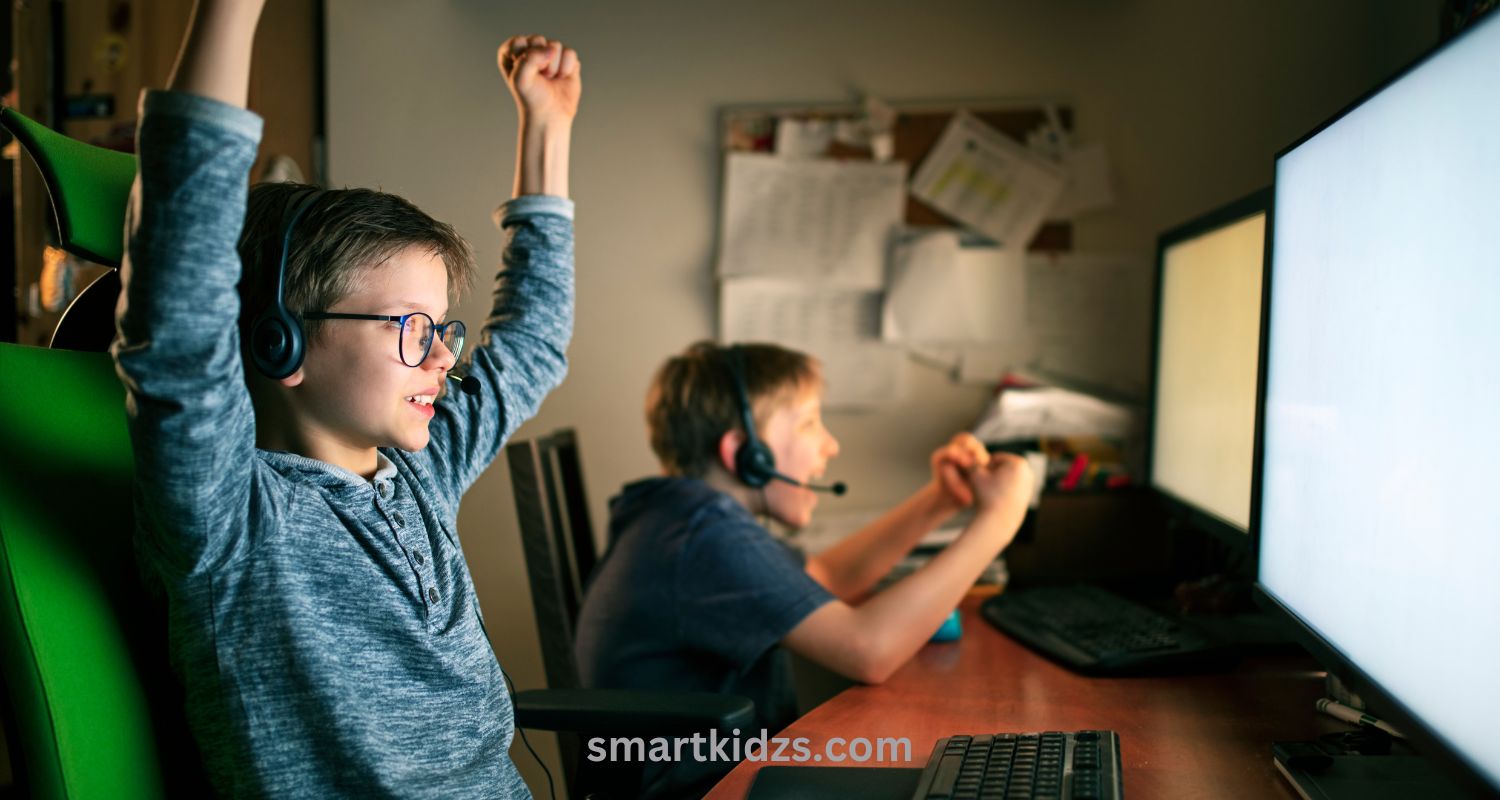The video gaming craze has become such a huge contributor in the socialization and entertainment of children that it can even be included in the educational sector. One obvious thing is that, as gaming trends set in, there rises a flood of worries among parents about what kind of impact gaming imposes on their children’s mental health.
Although gaming increases cognitive skills, problem-solving, and creative expression, an ardent or unregulated gaming schedule can lead to gaming addiction, disturbed sleep patterns, and an array of emotional difficulties.
In short, understanding the merits and demerits of gaming can help one help a child inculcate a healthy relationship with gaming. Parents can come into play by setting limits, choosing age-appropriate games, and encouraging a balanced lifestyle.
This article will discuss some effects of gaming on mental health in depth, the red flags parents can look for, and tips that parents can start working on so that their kids can enjoy gaming safely and responsibly.
Gaming’s Positive Effect on Mental Health
A moderate gaming session may be one of the few instances that provide mental health benefits. These few benefits are examples of how gaming improves cognitive or emotional well-being in children.
-
Helps Develop Cognitive Skills
A good number of video games involve the use of strategy, problem-solving, and decision-making in a matter of seconds that help in skill development. Puzzle-solving, resource management, and quests will improve memory retention, attention span, and logical reasoning.
- Enhances problem-solving and critical thinking skills.
- Improves memory and hand-eye coordination.
- Strengthens decision-making skills under pressure.
Example: Strategy games like Civilization and Age of Empires require planning, adaptability, and critical thinking to win.
-
Enhancement of Social Interaction
Multiplayer games enable children to connect with friends and engage with others in a shared virtual space. They expand cooperative games to develop teamwork, communication, and leadership skills. However, competitive games help forge strategic alliances.
- Allows children to develop social and teamwork skills.
- Promotes communication and cooperation.
- Gives a sense of community and belonging.
Example: Games such as Fortnite, Among Us, and Minecraft help players collaborate, strategize, and solve problems in real-time.
-
Stress & Anxiety Relief
Gaming helps many kids escape stress or anxiety. Someone engrossed in a game can actually distance his mind from immediate stressors and experience a sense of achievement and control in the sense of becoming an avatar. Calming open-world games or creative modes help allay that stress and further improve mood.
- An entertaining and engaging medium for de-stressing.
- Gives a sense of achievement and progression.
- Could help reduce anxiety in children with more serious emotional disorders or social issues.
For example– Stress-buster games such as Animal Crossing and Stardew Valley provide an open space for creativity and relaxation.
-
Nurtures Creativity
Different video games allow players to build worlds, design characters, and create structures, thereby enhancing individuality, experimentation, and creativity. Sandbox-type games allow flexibility for exploration and innovation without strict rule enforcement.
- Cultivates artistry and problem-solving.
- Encourages ownership and creativity.
- Aids in the development of imaginative thinking and design skills.
Example: Minecraft and Roblox let kids build, code, and create their own virtual worlds, sparking creativity and independent thinking.
Possible Negative Consequences of Gaming
Though gaming interventions have many potential benefits, too much or uncontrolled gaming can adversely affect a child’s mental and physical health. Here are some key issues that parents need to be alert about.
-
Gaming Addiction
Compulsion may intervene in gaming addicts’ daily lives in excess. Kids who spend too much time gaming may neglect responsibilities; they may even find it difficult to keep up with school projects and withdraw from family and social activities.
- May lead to difficulty in balancing school, chores, and social life.
- Can cause irritability or frustration when not gaming.
- May result in poor time management and decreased focus on other activities.
Example: Kids who get lost in a few hours of multiplayer madness like Fortnite or Call of Duty may find it easy to ignore homework, meals, or even sleep.
-
Disruption of Sleep and Physical Health
When gaming goes through the night, sleep is often interrupted, leading to fatigue, lack of concentration, and irritability. Inactivity for long hours during gaming days is the opposite of physical activity with higher risks for obesity and bad posture.
- Blue light exposure before bedtime delays sleep onset and affects quality of rest.
- Lack of physical movement can lead to health problems like weight gain and muscle stiffness.
- Decreased outdoor playtime limits exposure to fresh air and natural light.
Example: Children who are gaming late into the night find it hard to wake up for school and focus, with low energy levels.
-
Emotional and Behavioral Alterations
With certain types of games-whether fast-paced, violent, and competitive-games may create aggression, frustration, and anxiety in children. Some children may even easily get annoyed or emotionally reactive if their gaming experience does not play out as they expect.
- Violent gaming may contribute to aggression in some children.
- Competitive gaming stresses them out when their play doesn’t work in their favor.
- Too much screen time can be detrimental to emotional development and mood steadiness.
Example: An angry, irate child from a multiplayer game loses a round and remains upset about it even when the gaming is over for the day.
-
Exposure to Online Risks
Multiplayer games bring children into close contact with strangers, exposing them to cyberbullying, exposure to inappropriate content, and predatory online behavior. Absent reliable checks, children could fall prey to harmful interactions, manipulation, or unsafe persuasion.
- Toxic environments come into play, including chat rooms where in-game harassment and subtle peer pressure exist.
- Some games provide unfiltered content that could be described as violent or suggestive.
- Financial risk online, plus those scams that facilitate in-game purchases.
Example: Some online gaming communities condone bullying or other negative behaviors, which puts pressure on kids to fit in through aggression.
How Parents Can Promote Healthy Gaming Habits
Parents are important in assisting children in developing healthy gaming habits. By creating limitations and encouraging balance, gaming can stay a positive and fun pastime that does not affect mental health or everyday responsibilities. The following are some actionable suggestions for parents:
-
Set Time Limits
Moderation in behavior can prevent gaming addiction and screen overuse. Setting daily and weekly gaming timetables helps ensure that gaming will not get in the way of schoolwork, chores, or quality family time.
- Determine a gaming schedule for the week, where 1-2 hours per day is a good option.
- Set parental controls for screen time.
- Encourage gaming with different activities.
Tip: A good rule is “gaming after homework.”
-
Select Age-Appropriate Games
Children are not playing every game. Parents should examine game ratings (for instance,, ESRB and PEGI) and read reviews to determine the age-appropriateness of game content in light of their child’s level of maturity.
- Good games include educational ones or ones that build skills.
- Do not introduce violent games or overemphasize winning in competitions to younger children.
- Talk to your child about game themes and messages.
Tip: Look through sites such as Common Sense Media, which offer extensive reviews on the content of games and their appropriate age rating.
-
Promote Breaks & Exercise
Sitting for hours can have pernicious effects on a player’s health and energy levels. Therefore, be sure to encourage kids to take frequent breaks every 30 minutes or so, along with outdoor activities that permit social entertaining with other children.
- Encourage outdoor play and sports or creative hobbies.
- Set a screen break rule for every 45 to 60 minutes.
- Engage the whole family in outdoor pastimes such as biking, hiking, or board games.
Tip: For every hour of gaming, kids should try to incorporate one hour of physical activity.
-
Monitor Online Encounters
Online gaming also exposes children to chatrooms, multiplayer communities, and strangers. Teaching kids the overall layout of internet safety will help them avoid nasty situations such as cyberbullying or online predators while indulging responsibly in gaming.
- Restrict communication from strangers in the privacy settings.
- Teach kids the safe online behavior of not sharing personal data.
- Make sure to ask who is joining in on the game and what are the conversations.
Tip: Encourage your kid to reach out to you in case he or she ever feels uncomfortable in an online game.
-
Play Together
By participating in games with your child, opportunities for bonding arise and insights into their gaming habits may be gained. Also, parents can model appropriate gaming behavior for children while enjoying the activity themselves.
- Consider playing cooperative or multiplayer games as a family.
- Use gaming as a means of connecting or initiating conversation.
- Pay attention to how your child behaves when they win or lose, or interact with others.
Tip: Family-friendly multiplayer games include Minecraft, Mario Kart, and cooperative puzzle games.
Video games possess their advantages and problems for children’s mental health. Moderate gameplay can help in improving children’s cognitive skills, enhancing creativity, and aiding relaxation. On the flip side, gaming endlessly or being exposed to improper contents of games can lead to gaming addictions, psychological trauma, and being unsafe online.
Parents need to create safe gaming environments for their children, meaning they set time limits, choose games appropriate for the child’s age, encourage intervals and physical activity, and ensure that they know with whom they are communicating online.
Acknowledging that it is acceptable for parents and children to talk about gaming and allow their children the ability to make wise choices will encourage a responsible attitude toward gaming that will help maintain a healthy lifestyle for the child.
Children should learn to balance their gaming enjoyment through time management, understanding the facets of online safety, and parental involvement in the child’s gaming activities without compromising their mental well-being. Responsible gaming promotes children’s engagement, skill development, and mental health enhancement in a digital world.


